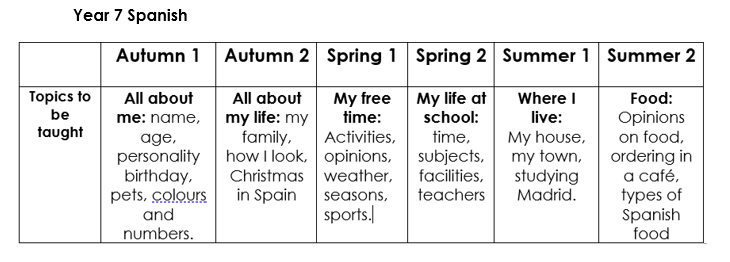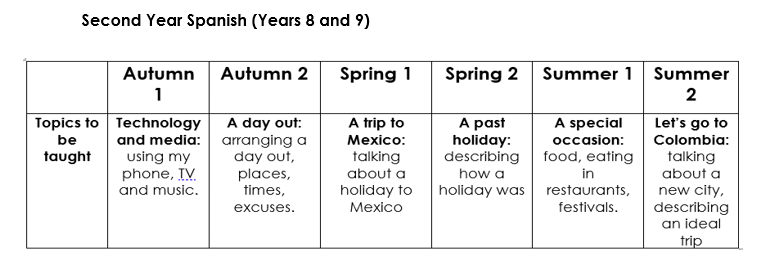Languages Curriculum Intent
In the Languages department, we have high aspirations for our students. Through our curriculum, we intend to give all students the knowledge, linguistic skills, and cultural understanding that they need to be successful linguists. By teaching our students about the language and culture of Spanish and German speaking countries, we aim to help our students grow into open-minded, culturally aware, empathetic adults as well as skilled linguists who have the tools needed to travel, meet a range of new people and potentially live and work abroad in the future. Students at Grace Academy will study either German or Spanish from Year 7 to Year 9 and will then opt whether to continue with that language to GCSE and A-level.
In Spanish and German, the curriculum is based around the 3 key pillars of grammar, vocabulary, and phonics. Securing a good understanding of these pillars enables students to communicate effectively in their second language. Students will be able to understand and produce language about a variety of topics, building their language skills as they move through the school. In addition to an excellent curriculum, we also believe that it is important to foster a love of languages. We not only aim to make language lessons as enjoyable as possible, but we also provide numerous extra-curricular opportunities to enrich their experience of language learning. This includes theatre visits, dance workshops, cooking lessons, trips abroad, Language Ambassadors and Languages Club.
Year 7
The Year 7 curriculum aims to build on the key language-learning skills developed at Key Stage Two, regardless of the language studied.
Students start by being able to express basic information about themselves in either German or Spanish. Throughout the year they will deepen their knowledge, enabling them to talk about others, use increasingly longer sentences and talk about a range of topics, including their life at school and at home. Students will focus on key new sounds and will work on pronouncing the accurately.
In terms of grammatical knowledge, students at the end of Y7 understand the concepts of gender and plural agreement and can conjugate common verbs in the present tense, including being able to use common irregular forms. They will also be able to speak about certain topics in the future tense. Students in Year 7 also study festivals and celebrations from Spanish and German speaking countries, including Christmas and Easter.

Useful websites for revision and additional support:
BBC Bitesize KS3 Spanish: https://www.bbc.co.uk/bitesize/subjects/zfckjxs
Oak Academy Year 7 Spanish: https://classroom.thenational.academy/subjects-by-year/year-7/subjects/spanish
Lyrics Training – https://lyricstraining.com/es/
Second Year Spanish (Years 8 and 9)
In their second year of studying Languages, students in both languages will talk about holidays, as well as exploring the media, technology and making plans with others. This builds on the vocabulary knowledge that they gained in Year 7. In terms of their grammatical knowledge, students can use more irregular verb structures, as well as using 3 different time frames to talk about what they did in the past and will do in the future. They continue to develop their communicative skills through an enhanced focus on speaking in lessons and will have increasingly accurate pronunciation. Students will again look at the culture of Spanish and German speaking countries, which will involve studying Día de los Muertos for Spanish and looking at German TV shows. At this stage we also ensure that the links between language learning and careers are explicitly taught to students, to ensure that they understand the relevance of language learning. Students will have the chance to participate in a translation workshop from a local translation company.

Useful websites for revision and additional support:
- BBC Bitesize KS3 Spanish: https://www.bbc.co.uk/bitesize/subjects/zfckjxs
- Oak Academy https://classroom.thenational.academy/subjects-by-year/year-8/subjects/spanish
- Lyrics Training – https://lyricstraining.com/es/
GCSE
Our students’ learning journey in MFL so far has sought to equip them with key language, grammar, and pronunciation they need to be able to communicate. GCSE builds these topics and language skills, to enable students to communicate more confidently and use increasingly more complex language. Students will also develop increased cultural awareness, studying new customs and festivals in countries where their language is spoken. With their increasing level of maturity and linguistic competence, students tackle more challenging and thought-provoking topics ranging from the Environment to Poverty and Homelessness, whilst also looking at topics that are relevant to their current lives such as School, Family, Holidays and Hobbies in much more depth. They practise all 4 language skills of listening, reading, writing, and speaking, which they are assessed on in the external examinations. By the end of the GCSE course, students are able to have conversations in multiple tenses about a range of topics, expressing opinions and reasons. Students will have the opportunity to use their language skills in meaningful situations, including a trip abroad.
KS4 (found under year 10 & 11 tabs)
Course information:
Exam board: AQA
4 exams worth 25% each: Listening, Reading, Writing and Speaking.
Speaking will take place before the Listening, Reading, and Writing exams in the summer. This is usually around April and May.
Content:
There are three themes with several sub-topics.
https://www.aqa.org.uk/subjects/languages/gcse/spanish-8698/specification-at-a-glance
Theme 1: Identity and culture
Topic 1: Me, my family, and friends
Topic 2: Technology
Topic 3: Free time
Topic 4: Customs and festivals in the Spanish-speaking world
Theme 2: Local, national, international and global areas of interest.
Topic 1: Home, town, neighbourhood, and region
Topic 2: Social issues
Topic 3: Global issues
Topic 4: Travel and tourism
Theme 3: Current and future study and employment
Topic 1: My studies
Topic 2: Life at school/college
Topic 3: Education post-16
Topic 4: Jobs, career choices and ambitions.

Useful websites for revision and additional support:
GCSE Bitesize: https://www.bbc.co.uk/bitesize/examspecs/z4yyjhv
Past papers: https://www.aqa.org.uk/subjects/languages/gcse/spanish-8698/assessment-resources
Why learn a language? Birmingham University: studying languages
Create your own revision cards: https://quizlet.com/en-gb

Useful websites for revision and additional support:
GCSE Bitesize: https://www.bbc.co.uk/bitesize/examspecs/z4yyjhv Past papers: https://www.aqa.org.uk/subjects/languages/gcse/spanish-8698/assessment-resources
Why learn a language? Birmingham University: studying languages
Create your own revision cards: https://quizlet.com/en-gb
